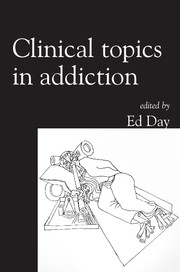Book contents
- Frontmatter
- Contents
- List of tables
- List of boxes
- List of figures
- List of contributors
- Foreword by Nat Wright
- Preface
- 1 What works in drug addiction?
- 2 The development of the drug treatment system in England
- 3 Stimulant use still going strong
- 4 Adverse effects of khat: a review
- 5 What the clinician needs to know about magic mushrooms
- 6 What works in alcohol use disorders?
- 7 Management of alcohol detoxification
- 8 Nicotine addiction and smoking cessation treatments
- 9 Pathological gambling: an overview of assessment and treatment
- 10 Use of investigations in the diagnosis and management of alcohol use disorders
- 11 Laboratory investigations for assessment and management of drug problems
- 12 Pharmacotherapy in dual diagnosis
- 13 Dual diagnosis: management within a psychosocial context
- 14 Treating depression complicated by substance misuse
- 15 Treating anxiety complicated by substance misuse
- 16 An overview of psychological interventions for addictive behaviours
- 17 Motivational interviewing
- 18 Substance misuse in adolescents
- 19 Management of drug misuse in pregnancy
- 20 Intoxication and legal defences
- 21 Substance misuse and violence: the scope and limitations of forensic psychiatry's role
- 22 Literary and biographical perspectives on substance use
- Index
15 - Treating anxiety complicated by substance misuse
Published online by Cambridge University Press: 02 January 2018
- Frontmatter
- Contents
- List of tables
- List of boxes
- List of figures
- List of contributors
- Foreword by Nat Wright
- Preface
- 1 What works in drug addiction?
- 2 The development of the drug treatment system in England
- 3 Stimulant use still going strong
- 4 Adverse effects of khat: a review
- 5 What the clinician needs to know about magic mushrooms
- 6 What works in alcohol use disorders?
- 7 Management of alcohol detoxification
- 8 Nicotine addiction and smoking cessation treatments
- 9 Pathological gambling: an overview of assessment and treatment
- 10 Use of investigations in the diagnosis and management of alcohol use disorders
- 11 Laboratory investigations for assessment and management of drug problems
- 12 Pharmacotherapy in dual diagnosis
- 13 Dual diagnosis: management within a psychosocial context
- 14 Treating depression complicated by substance misuse
- 15 Treating anxiety complicated by substance misuse
- 16 An overview of psychological interventions for addictive behaviours
- 17 Motivational interviewing
- 18 Substance misuse in adolescents
- 19 Management of drug misuse in pregnancy
- 20 Intoxication and legal defences
- 21 Substance misuse and violence: the scope and limitations of forensic psychiatry's role
- 22 Literary and biographical perspectives on substance use
- Index
Summary
Summary Anxiety and substance misuse often coexist, particularly with alcohol disorders. Anxiety can either lead to or arise from substance misuse, and determining the relationship between the two is key to their management. It is essential to establish whether a discrete anxiety disorder is present in patients with possible comorbidity. The neurobiology of anxiety and substance misuse, again particularly of alcohol, overlap with similar changes seen in especially the GABA, serotonin and noradrenaline systems. A combination of pharmacological and psychological approaches are available for both disorders separately, although few studies have examined approaches for such comorbidity.
The relationship between anxiety disorders and substance misuse is intimate. Here we concentrate on alcohol, although for completeness we also briefly mention other substances taken for anxiety relief or that cause anxiety.
The term ‘misuse’ is important and should be qualified. Many people drink alcohol or take illicit drugs without any apparent consequences. Once this use becomes problematic, at any level of consumption, misuse is a more appropriate term.
Recent research exploring the molecular underpinning of anxiety disorders, together with advances in our understanding of how alcohol affects brain neurochemistry, can help to explain this intimate relationship. We review the evidence and how this can provide a framework for both diagnosis and management in a patient with comorbid anxiety and substance misuse. Few studies address the best way of treating patients with dual diagnosis but several drugs are licensed for the treatment of individual anxiety disorders and are likely to be helpful in combination with alcohol treatment strategies.
Until recently, anxiety was used as an umbrella term that spanned the spectrum from normal human emotion to severe pathological states. The 1970s and 1980s heralded the beginning of a more rigorous approach to the discrete constellation of symptoms that make up the individual anxiety disorders. This has not only helped in tailoring therapeutic approaches but has also enabled researchers to explore the pathophysiological foundations of the various disorders. The ICD–10 (World Health Organization, 1992) categorises anxiety disorders as phobic (social, simple, agoraphobic), generalised, panic disorder and obsessive–compulsive disorder (OCD). Of these, the last is less robustly associated with substance misuse.
- Type
- Chapter
- Information
- Clinical Topics in Addiction , pp. 196 - 212Publisher: Royal College of PsychiatristsPrint publication year: 2007



